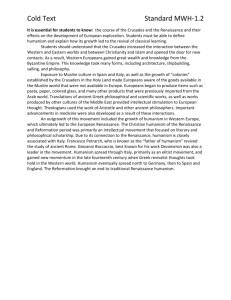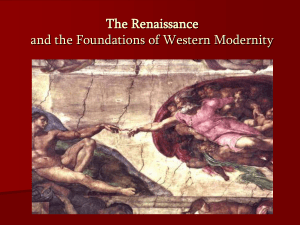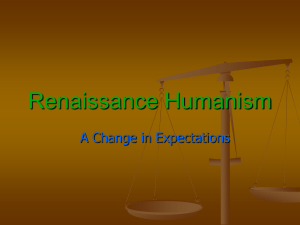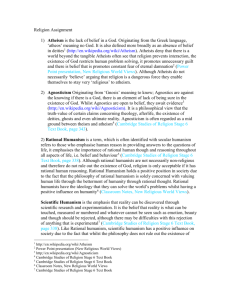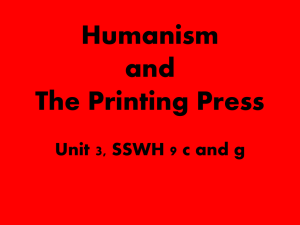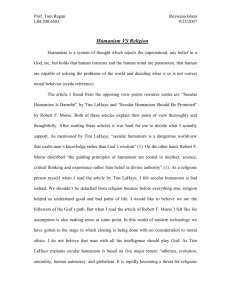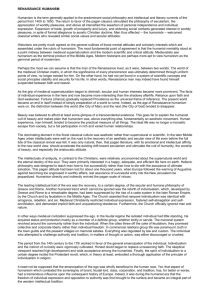Atheism, Agnosticism and Humanism
advertisement
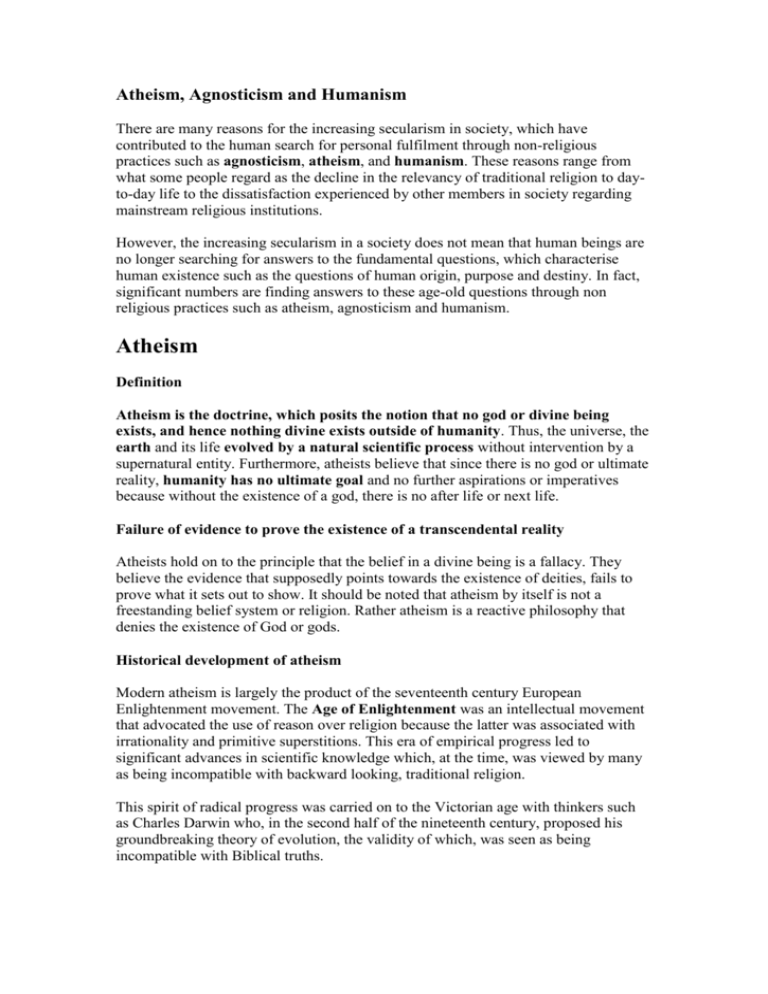
Atheism, Agnosticism and Humanism There are many reasons for the increasing secularism in society, which have contributed to the human search for personal fulfilment through non-religious practices such as agnosticism, atheism, and humanism. These reasons range from what some people regard as the decline in the relevancy of traditional religion to dayto-day life to the dissatisfaction experienced by other members in society regarding mainstream religious institutions. However, the increasing secularism in a society does not mean that human beings are no longer searching for answers to the fundamental questions, which characterise human existence such as the questions of human origin, purpose and destiny. In fact, significant numbers are finding answers to these age-old questions through non religious practices such as atheism, agnosticism and humanism. Atheism Definition Atheism is the doctrine, which posits the notion that no god or divine being exists, and hence nothing divine exists outside of humanity. Thus, the universe, the earth and its life evolved by a natural scientific process without intervention by a supernatural entity. Furthermore, atheists believe that since there is no god or ultimate reality, humanity has no ultimate goal and no further aspirations or imperatives because without the existence of a god, there is no after life or next life. Failure of evidence to prove the existence of a transcendental reality Atheists hold on to the principle that the belief in a divine being is a fallacy. They believe the evidence that supposedly points towards the existence of deities, fails to prove what it sets out to show. It should be noted that atheism by itself is not a freestanding belief system or religion. Rather atheism is a reactive philosophy that denies the existence of God or gods. Historical development of atheism Modern atheism is largely the product of the seventeenth century European Enlightenment movement. The Age of Enlightenment was an intellectual movement that advocated the use of reason over religion because the latter was associated with irrationality and primitive superstitions. This era of empirical progress led to significant advances in scientific knowledge which, at the time, was viewed by many as being incompatible with backward looking, traditional religion. This spirit of radical progress was carried on to the Victorian age with thinkers such as Charles Darwin who, in the second half of the nineteenth century, proposed his groundbreaking theory of evolution, the validity of which, was seen as being incompatible with Biblical truths. The increasing tension between secularism and religion had broad social implications. For example, this debate reverberated into eighteenth scholarship surrounding issues such as the authenticity of the Biblical texts. During this time, archaeological excavations and textual analysis of the Bible were undertaken to determine whether the Bible was a valid and accurate historical record. Agnosticism Definition Agnosticism is the belief that the evidence which is supposed to prove the existence of God is insufficient at the present time. Agnostics do not believe there is sufficient evidence to warrant the belief in the existence of a divine being. However, such matters could conceivably change in the future because if at a later date there is sufficient evidence to prove the existence of God then their views will change. The term agnosticism was coined by nineteenth century scientist Thomas Huxley who put together "a", which means not, with the word "gnosis" which is the Greek word for knowledge. This negative prefix to the word for knowledge underlined the assertion that there is not sufficient knowledge to require a belief in the existence of a divine being. Difference between atheists and agnostics Agnostics differ from atheists in the sense that they believe that the existence of god is still a possibility though at the current time evidence for the existence of god or gods is not conclusive. Atheists on the other hand, regard the issue as being closed. Humanism Definition Humanism is a philosophy, which is based on the belief that since there is no evidence which points to the existence of a supernatural being, then this life and this world are that matters. Key beliefs Therefore, in the light of this, human beings should try to live full, happy lives and make it easier for others to do the same. At the heart of humanism is the belief that human beings can and do have control over their own destinies, since supernatural intervention has been proven to be impossible. Thus, it can be said that humanism is a philosophy founded on the belief that human endeavour, experience, intelligence and compassion, are the foundations for all moral values. Humanism holds onto the belief in the intrinsic goodness of humanity, but recognises that human potential is far greater than current achievement. Humanists retain faith in human compassion and the intelligence of human beings to solve problems and make this world a better place for all to live. Humanists also believe that human beings have been successful in evolutionary terms due to an ability to manipulate and adapt to the natural world by working in a cooperative manner with other human beings. Humanism is a living philosophy that includes in its membership atheists but not agnostics. This is because humanism essentially adopts a scientific view of life which argues the view that evidence shows that this life, and this world are all we have. Therefore, humanists reject evidence which points towards the existence of a divine being. Christian humanism In addition to rational and scientific humanism, which are essentially secular worldviews, there is also Christian humanism. Christian humanism is a worldview characterised by a belief in God tempered by a scientific rejection of some of the key doctrines of Christianity, such as the immaculate conception and virgin birth, whilst affirming the fundamental importance of the human being and his or her achievements. Historical development of humanism The origins of humanism are usually attributed to a period in history known as the Renaissance which was a cultural movement beginning in fourteenth century Europe. During this period of intellectual discovery the writings of philosophers from classical antiquity were rediscovered and applied to contemporary art and science. As part of this rebirth of classical knowledge and revitalisation of the European culture was a movement away from God and a re-emphasis on the achievements and abilities of humankind. That is not to say that people living during the Renaissance did not believe in the existence of God but rather that they began to perceive God as being more of an impersonal force which controlled the universe which allowed God's laws to be understood through a detached scientific frame of mind. This shift in focus from the medieval understanding of God, led people to reemphasise the capacity and intelligence of human beings to understand the world around them, and to control their destiny. This climate of scientific, religious, literary and artistic upheaval gave way to an eighteenth century period, known as the age of Enlightenment. During this Age of Enlightenment rational humanism, which is also commonly known as secular humanism, began as a school of formalist humanism. Rational Humanism Definition and origins of rational humanism The period of the Enlightenment fostered the spirit of rational humanism, which proclaimed the belief that human progress through rational thought could be utilised to better the quality of life for all of humankind. Furthermore the age of Enlightenment encouraged the idea of modern democracy and egalitarianism, which became a fundamental precept of rational humanism. Thus, rational humanism is a philosophy, which supports the use of reason, compassion, equality, morality and ethics to build a better world for human kind. Scientific Humanism Definition and origins of scientific humanism Sir Julian Huxley, the first Director-General of the United Nations' Educational, Scientific and Cultural Organisation (UNESCO), founded scientific humanism, also known as modern humanism. Scientific humanism, as its name suggests places a significant emphasis upon science and technology to address the big problems of poverty, environmental degradation, social inequalities and other global issues faced by contemporary societies. Scientific humanism is concerned with world peace and equality Scientific humanism strives to achieve equality and peace on a global scale. The term scientific humanism should be used with caution however, because some scientific humanists feel that this term does not encapsulate their beliefs, as many appeal to emotion and morality in addition to reason in order to justify a moral belief.


